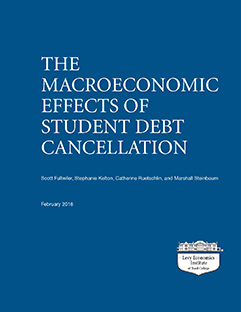
Research Topics
Publications on Consumer spending
There are 3 publications for Consumer spending.
-
Household Consumption, Household Indebtedness, and Inequality in Turkey
Working Paper No. 954 | April 2020A Microeconometric Analysis
This paper examines whether relative income and income inequality within reference groups affect household consumption. Using the explanations of consumption behavior based on Dusenberry’s relative income hypothesis, we test if household consumption levels in Turkey are affected by the household’s relative position and inequality in the reference group between 2005–12 by employing cross-sectional household-level data. We find that household consumption is negatively related to the relative income indicator after controlling for absolute income, and positively related to the income inequality of the reference group, as the literature suggests. The paper also shows that household indebtedness has a positive impact on household consumption when inequality in the reference group and the relative position of households are controlled for. We confirm that the results are not sensitive to chosen relative income indicators and income inequality.
Download:Associated Program:Author(s): -
The Macroeconomic Effects of Student Debt Cancellation
Research Project Report, February 2018 | February 2018 Among the more ambitious policies that have been proposed to address the problem of escalating student loan debt are various forms of debt cancellation. In this report, Scott Fullwiler, Research Associate Stephanie Kelton, Catherine Ruetschlin, and Marshall Steinbaum examine the likely macroeconomic impacts of a one-time, federally funded cancellation of all outstanding student debt.
Among the more ambitious policies that have been proposed to address the problem of escalating student loan debt are various forms of debt cancellation. In this report, Scott Fullwiler, Research Associate Stephanie Kelton, Catherine Ruetschlin, and Marshall Steinbaum examine the likely macroeconomic impacts of a one-time, federally funded cancellation of all outstanding student debt.
The report analyzes households’ mounting reliance on debt to finance higher education, including the distributive implications of student debt and debt cancellation; describes the financial mechanics required to carry out the cancellation of debt held by the Department of Education (which makes up the vast majority of student loans outstanding) as well as privately owned student debt; and uses two macroeconometric models to provide a plausible range for the likely impacts of student debt cancellation on key economic variables over a 10-year horizon.
The authors find that cancellation would have a meaningful stimulus effect, characterized by greater economic activity as measured by GDP and employment, with only moderate effects on the federal budget deficit, interest rates, and inflation (while state budgets improve). These results suggest that policies like student debt cancellation can be a viable part of a needed reorientation of US higher education policy.
Download:Associated Programs:Author(s): -
Flow of Funds Figures Show the Largest Drop in Household Borrowing in the Last 40 Years
Strategic Analysis, January 2009 | January 2009The Federal Reserve’s latest flow-of-funds data reveal that household borrowing has fallen sharply lower, bringing about a reversal of the upward trend in household debt. According to the Levy Institute’s macro model, a fall in borrowing has an immediate effect—accounting in this case for most of the 3 percent drop in private expenditure that occurred in the third quarter of 2008—as well as delayed effects; as a result, the decline in real GDP and accompanying rise in unemployment may be substantial in coming quarters.
For further details on the Macro-Modeling Team’s latest projections, see the December 2008 Strategic Analysis Prospects for the US and the World: A Crisis That Conventional Remedies Cannot Resolve.
Download:Associated Program:Author(s):
